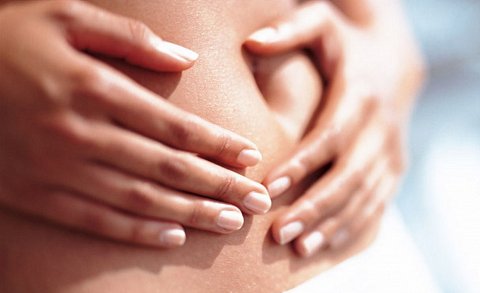-
Thryve Gut Health Program
review on February 19, 2019
by Craig Macpherson

At a Glance
Summary
According to the American Academy of Microbiology, bacterial cells may equal (or even outnumber) human cells in our bodies. The number and type of microbes resident in our digestive tracts are correlated with a number of health issues in our bodies.
Thryve is a San Francisco Bay Area-based health-tech start-up which has created a ‘Gut Health Test’ which measures (via fecal sample) the microbes in a customer’s gut. A number of reports correlate the customer’s microbe population with a series of health and wellness indicators, along with dietary recommendations as well as personalized supplements.
I’d recommend the Thryve Gut Health Test to someone interested in learning more about this fascinating field of biology and understanding how a healthy gut biome may influence overall health.
Full Review
Thryve, a division of Quantbiome based near San Francisco, purports to be the world’s first ‘gut health program’. There is a growing body of research on the importance of the ‘gut biome’ in human health. The types and proportion of bacteria and other microbes living in your digestive tract are alleged to affect not only how your food is processed, but also a wide variety of health indicators, including your complexion, sleep cycles, and overall mental state.
The Thryve Gut Health Test takes a sample of client’s fecal matter to test the content and diversity of the gut biome. Based on test results, Thryve creates a customized probiotic plan designed to optimize gut health.
The firm has already secured $1.4 million in venture funding and its Scientific Advisory Board boasts a number of leading scientists from Stanford, Harvard, MIT, and a former U.S. Food and Drug Administration (FDA) regulator.
Product Expectations
The Thryve website boasts a very clean user experience. Very much in line with a modern health-tech start-up. Bold claims include: Weight loss, curing digestive problems, and increased energy.
A simple three-step process for the Gut Health Test was clearly explained on the home page: 1) Get your gut tested, 2) Receive a personalized plan, and 3) Improve your health and “tackle your digestive immune, weight, and mood problems”.
And, sticking with the ‘three part’ theme, Thryve offered three parts to the program: 1) The Gut Health Test itself, 2) Personalized food recommendations, and 3) One bottle of personalized probiotics. Very simple (even if somewhat repetitive!).
The current state of science tells us that the modern diet and lifestyle have thrown our guts all out of whack. Thryve’s three-part plan claims to “repair your gut” with a level of precision not possible with other services.
What made Thryve’s model particularly interesting is the level of personalization on offer. Most available medical information online is indicated for a general audience, ignoring the great diversity of the human race (let alone the diversity within each of our respective digestive tracts). We’ve all tried to diagnose ourselves with online searches that often lead to little more than paranoia and hypochondria! Thryve serves as something of a personal dietician, noting that “what’s healthy for one person causes inflammation in another.”
I also appreciated Thryve’s dose of humility in its claims with regard to gut health. Often the very term ‘science’ is tossed around to back all sorts of product claims. Thryve acknowledges the real meaning of the word, and notes that “not all science is created equal...we give you full transparency into just how far the current science is for each recommendation.” An important caveat as the term ‘probiotic’ was not on the public’s radar a mere decade ago! And the company’s high-powered Board lent Thryve some credibility to back their claims in the burgeoning field of gut health and probiotics.
The probiotics market has very quickly become a crowded space; on an easy-to-read matrix on its homepage, Thryve distinguished itself from the competition with its focus on personalized formulas for clients, an ability to test a wider variety of gut microbes, and prebiotic boosters. Thryve claims that customers have “improved their health in as little as 7 days”, an admittedly vague claim. Finally, the firm promised a two-week turnaround for a comprehensive gut health test reviewed by in-house PhDs, and a money-back guarantee.
In summary, I was suitably intrigued by the possibility of higher energy, better sleep, and a nice bit of post-holiday weight loss.
Ordering Experience
Ordering the Gut Health Test kit was a breeze (with free shipping!) and it arrived on my doorstep just a few days later. I have to admit it felt a bit weird to take a fecal sample and drop it off at the U.S. Post Office, but all in the name of science and gut health!
First, the easy part - the kit was very straightforward. I entered my name, email address, and a unique password, along with the 5-character kit ID printed clearly on the box and I was now officially a Thryve customer.
I’d had some trepidation about the fecal sample. I’d never submitted one before for any reason, and I tend towards being squeamish in any case. However, as the team at Thryve eloquently put it, “the entire process is non-icky and should take 5-10 minutes to complete.” The collection kit included a swab and a ‘primary tube’ for storing the sample.
I had a couple of questions about my sample collection. Specifically, I wondered if there were any foods I should avoid, or if I should fast for a period of time before producing my sample. Annoyingly, the Thryve website chatbot only functioned during US West coast time zone business hours. Also, the chatbot pop-up obscured some registration info that I needed. Ok, end of gripe. Finally, I got my response, and I ate as I normally would before submitting the test.
So, after my morning coffee, I sat down for my regular bowel movement. After my first wipe, I lightly ran the cotton swab over the soiled part of the toilet paper fairly thoroughly. The swab was then placed in the ‘primary tube’ and stirred for 20 seconds. After closing up the tube, I shook it for 5 seconds, and put it in the postage pre-paid box included with my kit and off it went to Culver City, California.
The Results
My results arrived less than one week after they’d received my sample! A very impressive turnaround. Upon logging in to check my next steps, I was asked to submit a questionnaire on a few of my personal health indicators. These included: Health concerns, sleep quality, energy levels, weight, skin type, mood, gender, and age.
The Thryve website has a very simple interface for helping to navigate the admittedly quite complicated reports, including short embedded YouTube videos designed to help understand each section of the report.
Thryve’s introduction to the ‘probiotic recommendations’ of the report left me rather surprised - they were said to be “80% based on the questionnaire and 20% based on the test result.” If the recommendations were based mostly on the questionnaire, why did I bother with the fecal sample!?
Still, my curiosity was piqued, and I began to look over the four sections of my Gut Health Report: Probiotic Recommendations, Food Recommendations, Health Report, and My Gut Bacteria.
Results Section: Probiotic Recommendations
The Probiotic Recommendations section opened with a pitch for a probiotic supplement subscription. The description of my own suggested blend included probiotics which would counter the microbes I lacked based on my fecal sample, as well as probiotics which had been shown to help patients who shared my weight loss goals. Each component probiotic was followed by a brief description of its health benefits.
For example, my own suggested blend contained Lactobacillus reuteri Tr1 (ADR1) which “lowers blood lipid levels, lowers cholesterol, improves gut health”, see below.
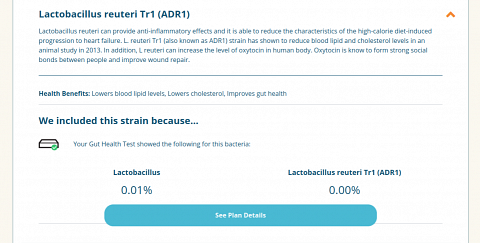
The Lactobacillus reuteri Tr1 (ADR1) breakdown.
Lactobacillus rhamnosus which improves gut health, mental health, and immune health. Lactobacillus casei alleviates diarrhea, improves liver function, combats stress, and improves immune health. Bifidobacterium lactis is purported to help with weight management, combating obesity, preventing infections, improving gut health, improving immune health, and also boasts antioxidant properties.
Finally, in the category “Prebiotics, Vitamins, and Minerals” the polysaccharide Inulin is credited with improvement in gut health, constipation, immune health and weight management.
Thus suitably informed, I was invited to order a monthly supply of 60 capsules with a subscription rate of $49.99 per month. The supplements are gluten free, GMO free, nut free, and egg free. I was intrigued by the offer of having personalized supplements, but wanted to take a look at the food recommendations first.
Results Section: Food Recommendations
My personalized dietary plan (per Thryve) was a little overwhelming. A drop-down menu contained a list of seemingly every food on earth from abiyuch (Southeast Asian fruit high in vitamin C) to zander (fish native to Eastern Europe).
Upon clicking on ‘apple’, for example, I received a lot of general information about the common fruit (paleo friendly, whole 30 friendly, vegan friendly), along with information specific to my results. For instance, eating apples could help increase Blautia and Ruminococcus bacteria in my gut, both of which were recorded as “low” in my results, see below.
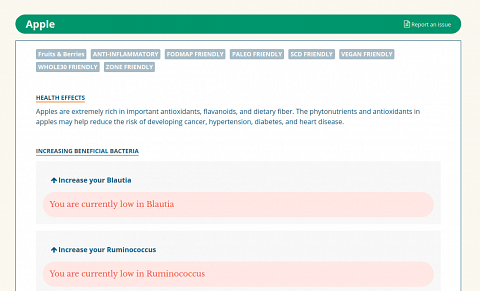
The benefits of apple on my microbiome.
Upon scrolling down, I learnt that the “research confidence” connected to apples and gut bacteria was considered “strong”, and I was given links to a number of studies from reputable scientific journals, like the BMJ (formerly known as the British Medical Journal). At the bottom of each section were a number of recipes including the food in question. With apples, this ranged from spiced red cabbage to candied apples (delicious!).
It would seem rather painstaking to scan each food I liked to eat and see what it might do to my gut bacteria, but it was certainly cheaper than the $49.99 subscription supplements (although perhaps not with higher grocery bills!).
Results Section: Health Report
My personalized health report was comprised of ‘Gut Wellness’ and ‘Gut Diversity’ scores, along with a ‘Likelihood Analysis. The Gut Wellness score compares the microbes in my gut to that of the healthy American population. I was delighted to receive a 76% (‘Superb’) score on this front, but was not exactly sure what that meant for me, aside from the fact that I shared similar gut bacteria to a subset of ‘healthy’ people.
My Gut Diversity score was also rated ‘Superb’ with the added bonus of being described as a “booming rainforest with a growing population of species.” Although how the population of gut microbes could be described as “growing” based on one sample was not quite clear to me!
The health report page also included a link taking me back to the personalized probiotic blend subscription, but I’d already reviewed that.
The Likelihood Analysis is where things got interesting. It was clearly stated that the analysis is not a diagnosis. But ailments such as worries, constipation, weight gain, fatigue, and dry skin were correlated with the proportion of various bacteria in my gut versus that of the general population, see below.
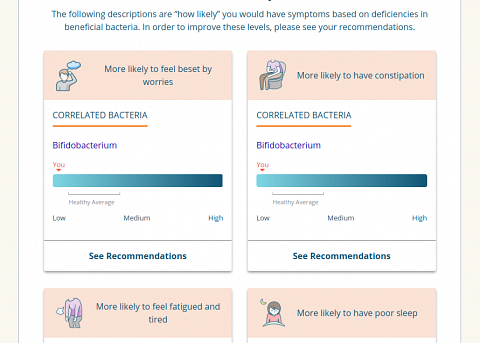
My microbiome's relationship to worries and constipation.
My gut feeling (if you’ll forgive the pun), was that this felt like a stretch given the available data. But perhaps an insightful look into the direction of future research on gut health.
Results Section: My Gut Bacteria
This section is clearly intended for the data scientist. I easily downloaded the raw data on the entire measurable population of my gut microbes in .csv format.
Learning that my gut bacteria ecosystem is made up of 48.509% (or 48.394 - depending on which page) Bacteroidia feels like an interesting bit of trivia at a party, but it is not clear to me what I can do with this information, see below.
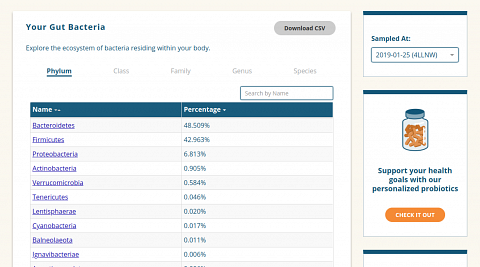
My Gut Bacteria.
Perhaps I missed this somewhere on the site, but I think what would perhaps be more interesting is to measure how my gut biome changes over time depending on diet, supplements, and other external factors. But this single measurement feels a little unhelpful, or perhaps just more like a starting point.
Summary
According to the American Academy of Microbiology, bacterial cells may equal (or even outnumber) human cells in our bodies. The number and type of microbes resident in our digestive tracts are correlated with a number of health issues in our bodies.
Thryve is a San Francisco Bay Area-based health-tech start-up which has created a ‘Gut Health Test’ which measures (via fecal sample) the microbes in a customer’s gut. A number of reports correlate the customer’s microbe population with a series of health and wellness indicators, along with dietary recommendations as well as personalized supplements.
I’d recommend the Thryve Gut Health Test to someone interested in learning more about this fascinating field of biology and understanding how a healthy gut biome may influence overall health.
Please note we were invited to take this test free of charge.

